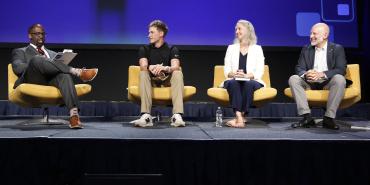In a rousing speech that brought hundreds of educators to their feet in the spirit of solidarity and action, AFT Secretary-Treasurer Fedrick Ingram reminded TEACH attendees what the AFT stands for: the “relentless pursuit of a better public education system, a better body politic and, in fact, a better life for all.”
Calling out the “bully” in Washington, D.C., Ingram noted that elections matter, but he showed that teaching matters more. “Teaching is not a transactional partnership. … It’s a long-term proposition for human power and dignity,” he said, adding, “Teaching … is a revolutionary act.”
As he introduced the educators and researchers to follow him, Ingram shared some sobering numbers that drove the TEACH general session on Saturday: 46 percent of teachers say student engagement has declined compared with 2019, and 83 percent of students feel there aren’t enough opportunities for curiosity at school, according to a 2024 Harris Poll from Discovery Education.
“We know that we need to take students to deeper learning where they can think critically, solve complex problems, communicate effectively and work both independently and collaboratively. Yet, despite all our efforts as a community of educators, in so many places we are not there yet,” said Ingram.
One place it is happening is Ohio, where the AFT worked to engage students and spark the love of reading by creating “Encouraging and Developing Literacy at Home” modules to bring families and communities into the effort. Lisa Storm, Greenon Federation of Teachers vice president, shared that under the leadership of Ohio Federation of Teachers President Melissa Cropper and through a partnership with First Book and Learning Lighthouse, the union hosted three family-focused events this year, culminating in a Literacy Carnival for their youngest learners. Storm explained how they used the AFT’s modules to foster family literacy—and she challenged other locals to do the same.
Cornelius Minor, a teacher, author and member of New York City’s United Federation of Teachers, challenged the room to redefine what caring about engagement looks like in a changing world. He shared an inspiring example of recognizing and addressing the engagement gap: After noticing that three students routinely abandoned class for long bathroom breaks, he realized what looked like a hallway pass problem was really an engagement problem. These students had difficulty reading—so they left. To draw them back in, Minor changed the curriculum to start the class with activities that made those students feel smart and worthy instead of forcing them to confront a weakness they feared.
But engagement is not a straight line that educators can simply push students to cross. One of the session’s panelists was Rebecca Winthrop, director of the Center for Universal Education at Brookings, who said engagement is a spectrum that can be characterized by four types:
- Passenger mode—Students put forth minimal effort, are not challenged.
- Achiever mode—Students are so focused on the end goal they lose sight of the journey.
- Resister mode—Students are disruptive but bold in telling you what is not working.
- Explorer mode—Students feel they have the freedom and choice to be creative, make mistakes and find meaning in their work.
Winthrop discussed a recent Brookings Institution poll of more than 65,000 students that showed less than 10 percent of students ever feel like they get to explorer mode, meaning the vast majority do not feel they have the necessary autonomy to learn at their highest potential.
To combat this, Winthrop advocated for classrooms without cellphones or social media—saying students’ developing brains simply cannot resist the type of endorphin rush TikTok and Candy Crush provide.
Another tool to combat lack of engagement is through experiential learning, which provides hands-on opportunities to learn by doing. Panelist David Chizzonite, a teacher and New York State United Teachers board of directors member, praised the way STEM programs and the partnership between the AFT and Micron have not only brought emerging tech to the students but also allowed them to be explorers and engage their curiosity.
“I’ve really tried to bring the aspects of what engineers do in the daily job into the classroom,” said Chizzonite. The kids “create their own individual team structures, they create their own leadership roles, and they have so much agency. … I’m more of a facilitator. … They are the driving force behind their learning.”
Minor echoed these ideas. “How do I engage in the kind of bold work necessary to serve my students and to serve my community?” Minor asked. We must be willing to reimagine things we think we know and to do the messy work of dreaming. “How we act on our belief in children must be different now. … What boldness looks like in 2025 … has to be a little different.”
[James Hill]

